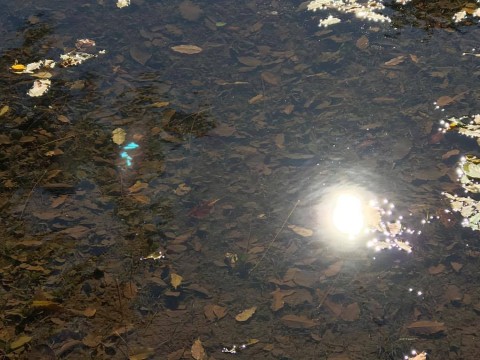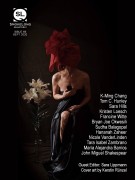The news comes at noon, wrapped in a husky voice over the radio–”…The Republic of Biafra ceases to exist. We remain an indissoluble, indivisible nation known as the Federal Republic of Nigeria. Long live Nigeria.” I blink twice. From the window, I can see people in the streets, celebrating. There are women putting sand in their hair, swaying their hips with exaggerated steps. Young girls gather around them, clapping and singing about a woman who swallowed the testes of her husband while trying to give him pleasure. The school children run around the mud-fenced yard, throwing palm fronds in the air, their skinny limbs trying to remember this sport. The older men look on, uninterested. They know when a war is over and when it has been postponed. I look away too.
I will turn fourteen next week but I am not sure the world knows. Even my mother. She is sprawled against the kitchen wall staring at a lizard nodding atop the fence. Her breasts are bare and pointed as if aiming for the lizard. I cannot tell if she is thinking of eating the lizard or of my father’s return from the war. There are prayers in her eyes.
I walk to the door. The sun is a reddened orange leaving the earth still and shadowless. The path to the village stream is a lonely one. I can feel the hard soil beneath my feet. It is early June but the rains still come down in teasing flashes, just enough to dry up quickly during the day. The peppers and the pumpkins behind the house didn’t do well, and when I harvested the corns late April, there was something mockingly sad about their stunted stalks and seedless cobs.
A squirrel darts past. I jump. If my father were with me, he would have knocked me and said, “Good meat, good meat. You let it go, gbo?” The last time I ate meat was the day the neighbours brought news of the enemies’ defeat at Abagana, claiming the Biafra militia had dealt a heavy blow to the Nigerian soldiers, that ‘we’ were winning the war. That night, mother picked Sissy and chopped her into tiny red bits for the stew while her kittens looked on in horror. I knew the war was doing something to mother and with Sissy in the stew, boiling into a thick broth, I knew there was something about ‘we are winning the war’ that didn’t seem true. Father joined the militia the next day, although he had just one arm. That was a year ago.
In the distance, Segun sees me before I see him. “Aha! My light,” he says, smiling, and it pleases me that he was hopeful I would come. His teeth are stained a bright yellow from chewing palm kernels. He had heard the news also, he says, hugging me. We sit on the grass watching the ripples on the water glisten in the sun. His hands are still clasped in mine and I like that the thought of letting go doesn’t cross his mind.
“Kedu? How are you?” he asks. I can hear the concern in his tone, that it isn’t just a casual question, and l like that too.
“I am well,” I say, looking at him because I want him to believe I am well.
Our silence lingers. The first time I met him at the stream, sitting on a rock eating cashews, his shorts were torn from dirt. For a moment, I thought he was Igbo until I said ‘kedu’ and he didn’t reply. There was a fragility in his stare that fixed me to a spot for a while before I fled. I told no one I had seen the enemy and that he was a young Nigerian so fine I would never imagine he could kill. The next day when I saw him again, he was unclad, bathing in the stream and I did not look away. He stared at me for a while, then beckoned for me in pidgin to join him.
“You will go. Won’t you? You will return to Nigeria.” I curse myself for speaking first. He caresses my chin with a finger, I can smell the oil on it.
“You will remain here,” he says, touching his chest.
He leans forward to kiss me and soon he is thrusting inside me, whispering my name in my ears, “Ifem, my light.” I close my eyes, then dig my nails in his back, marking him, making him mine. I do not know the meaning of his name, Segun, or perhaps I cannot recall.
He does not collapse beside me after he is done. He runs to the river, still naked, and calls at me to join him. He washes me gently, singing a tribal song. I want to ask him what it means, those rolling vowels of his; instead I ask him how one can love a country and hate its people. He hushes me, tells me questions ruin beautiful moments. I wash him too.
On my walk home, I pick a Biafra flag caught on a twig. Its edges are tattered. Dark clouds cover the sky like gathered wool. A feeling grips me; which is worse–loving a fellow boy or making love to the enemy, a Nigerian soldier? The world is silent. Swans sway in my head.



 The core workshop of SmokeLong Fitness is all in writing, so you can take part from anywhere at anytime. We are excited about creating a supportive, consistent and structured environment for flash writers to work on their craft in a community. We are thrilled and proud to say that our workshop participants have won, placed, or been listed in every major flash competition. Community works.
The core workshop of SmokeLong Fitness is all in writing, so you can take part from anywhere at anytime. We are excited about creating a supportive, consistent and structured environment for flash writers to work on their craft in a community. We are thrilled and proud to say that our workshop participants have won, placed, or been listed in every major flash competition. Community works.